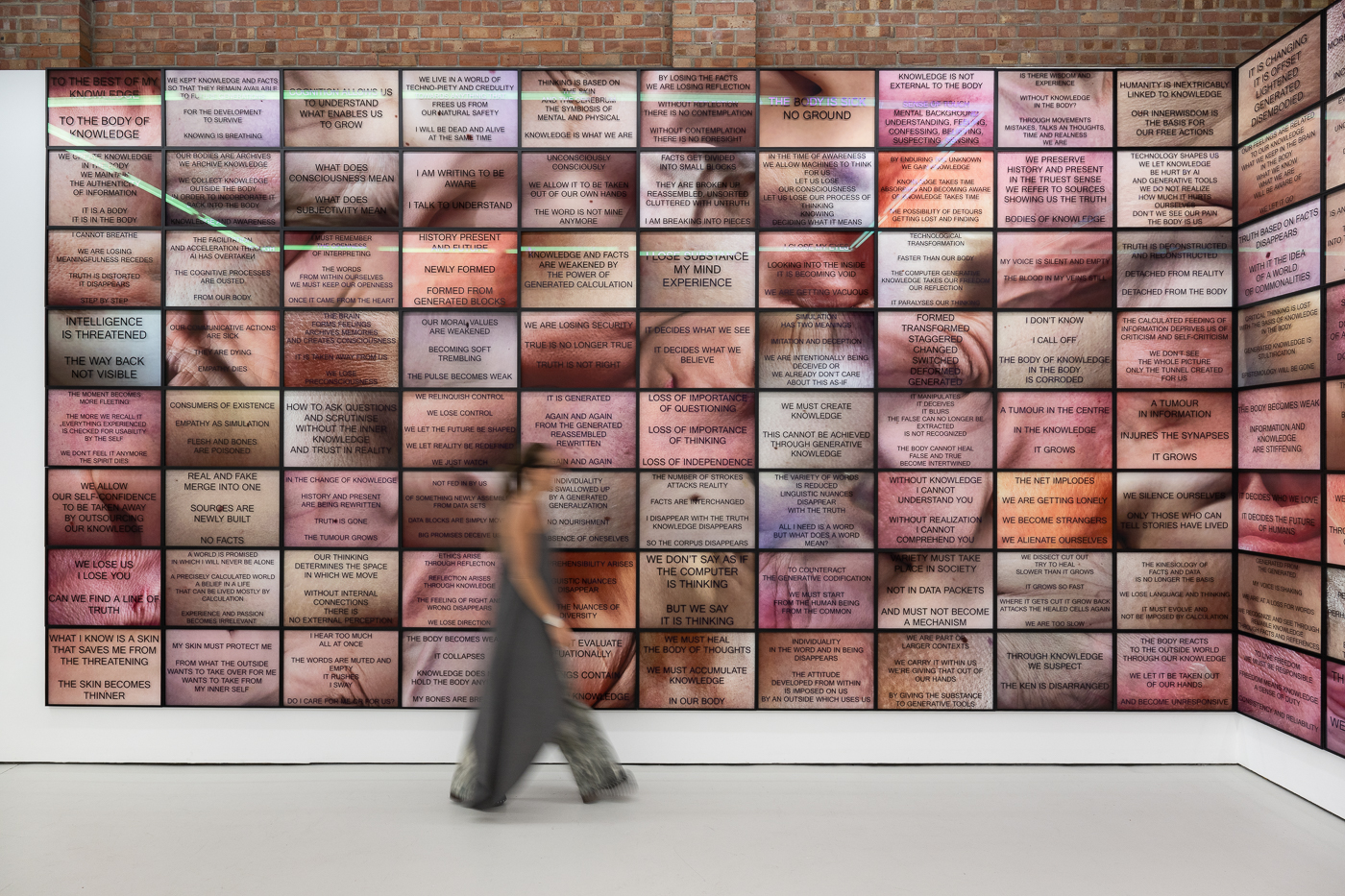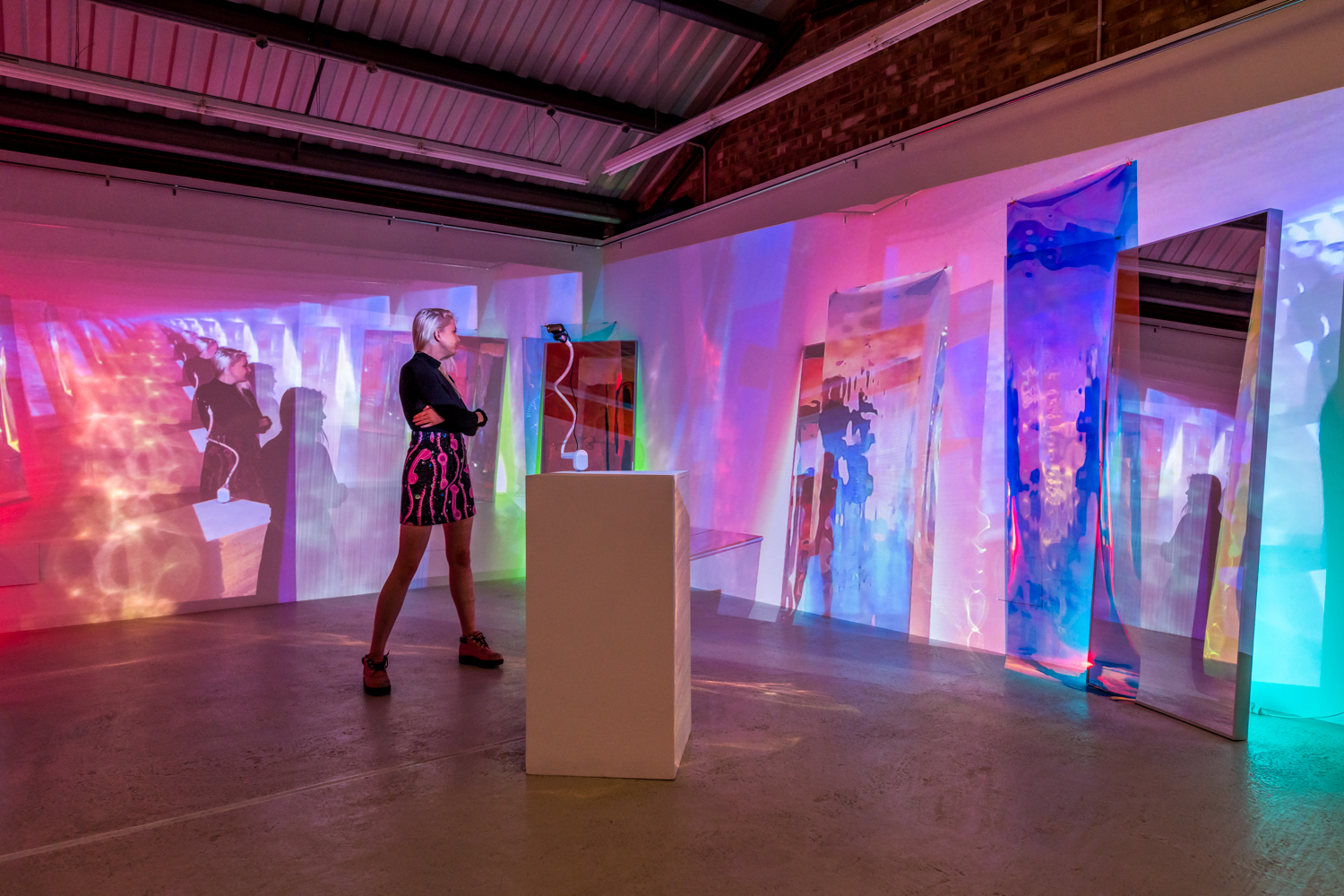Signe Pierce’s performative contribution A glitch in the echo chamber of big sister’s cave to ANTI, the 6th Athens Biennale, has been featured on Daily Lazy.
ANTI : 6th Athens Biennale 2018 / Athens, Greece
ANTI : 6th Athens Biennale 2018 // Curated by Stefanie Hessler, Poka-Yio, Kostis Stafylakis
Spyros Aggelopoulos / Monira Al Qadiri / Loukia Alavanou / Korakrit Arunanondchai & Alex Gvojic / Ivana Bašić / Tianzhuo Chen / Chim Pom / Sarawut Chutiwongpeti / Brody Condon / Celia Daskopoulou / Ted Davis / Danielle Dean / JP Downer / Nina Runa Essendrop / Georgia Fambris / Cao Fei / Ed Fornieles / Angelos Frentzos / Sarah Friend / Front Deutscher Äpfel / Dorota Gawęda & Eglė Kulbokaitė / Eva Giannakopoulou / Gigas / Joey Holder / Höller / Callum Leo Hughes / Actually Huizenga (of Patriarchy) / Jacob Hurwitz-Goodman & Daniel Keller / Binelde Hyrcan / Maryam Jafri / Sascha Jahn & TheBoundCollective / Jakub Jansa / Geumhyung Jeong / Kahlil Joseph / Florence Jung / Raja’a Khalid / Joy Kolaitis / Peter V. Kritikos / Laboratory for Microclimates/ Euripides Laskaridis / Osmosis / Delaine Le Bas / Candice Lin / Fei Liu / Rachel Maclean / Basim Magdy / Miltos Manetas / Marianne Maric / Eva and Franco Mattes / Metahaven / Quenton Miller / Molleindustria / Shana Moulton / Sirous Namazi / Narcissister / New Models / Pinar Öğrenci / Marisa Olson / Uģis Olte & Morten Traavik / Omsk Social Club / Ilias Papailiakis / Eva Papamargariti / Yuri Pattison / Heather Phillipson / Signe Pierce / AnnaMaria Pinaka / Wong Ping / Michail Pirgelis / Agnieszka Polska / Lykourgos Porfyris / Porpentine Charity Heartscape / Johannes Paul Raether / Jon Rafman / Kosta Rapadopoulos / Jasin Challah / Tabita Rezaire / Roee Rosen / Iepe Rubingh / Saeborg / Tai Shani / Heji Shin / Aliza Shvarts / Helle Siljeholm / Marianna Simnett / Linnéa Sjöberg / Panos Sklavenitis / Marilia Stagkouraki / Jenna Sutela / The Agency / The Domestic Godless / The Peng! Collective / Ryan Trecartin / Theo Triantafyllidis / Anna Uddenberg / Nicole Wermers / Tori Wrånes / Lauren Wy / Lu Yang / Young Boy Dancing Group / Costas Zapas / Zhala
26 October – 09 December 2018
Exhibition Venues TTT Building (Main Venue), 15, Stadiou Str. 10561 Athens
Esperia Palace, 22, Stadiou Str. 10564 Athens
Benakeios Library, 2, Anthimou Gazi Str. 10562 Athens
TSMEDE, 4, Kolokotroni Str. 10562 Athens
| The 6th Athens Biennale centers on the (im)possibility of ANTI, offering a distinct, idiosyncratic, and uneasy screenshot of our political, social, and cultural momentum. The exhibition dissects the way we polarize, fight, and antagonize in post-digital times: in the age of social media, of neo-reactionary movements, of post-truth nihilism, and of conspiracy theories developed by the alt-right. ANTI considers strategies that go beyond the algorithmic, visual, and political regimes weaponized by regressive and fascist agendas. At present, an oppositional stance seems to encompass wide arenas of social life including cultural expressions, identity politics, art labor, media, and scripted protagonist impersonationson Netflix as well as “weird advertising,” videogames, and music video productions. In other words, attitudes of resistance, nonconformity, and marginality are rapidly becoming canonized and commodified, while structural violence against otherness continues to exist. ANTI is adored and detested as preeminent role model. The imagery of the cunning villain, the proactive manipulator, the taboo perpetrator is one of today’s most fascinating character in institutional and counterestablishment politics, tactical resistance, and pop culture. ANTI inhabits both power and resistance. This has been painfully realized by countercultural movements from the 1960s and 70s, being turned into proto-types for theories of neomanagement, and by supporters of Anonymous, realizing the innocuous revolutionaries’ Janus face in form of hatemongering internet trolls. While accelerating polarizations have been recognized as driving force of the political, cultural, and social climate for decades, today we might ask how antagonism is stirred in a neo-behaviorist present shaped by digital cybernetics, echo chambers, algorithmic revamping, and online warfare. The artists in ANTI ask how, if at all, we can engage in the technologically augmented utopias of today. Rather than assuming a position of critical detachment or dialectic negation, the artistic devices composing the biennial introduce us to the enjoyment and discomfort embodied by opposition, asking what might motivate reactionary fantasies while critiquing them and and dwelling on progressive pleasures. The exhibition device becomes a purgatory without a purge. Increasingly, oppositional uprisings involve mystical or conspiratorial understandings of the world. In quasi-theological terms, those revolting often speak of malevolent forces controlling the cosmos: call them speculative finance or reptilian aliens. When “reality” cannot be trusted anymore, emotional states are employed as claims for legitimation. Like modern day ancient or medieval Gnostics, conspiracy theorists, spiritualists, and preachers of individual wellness are working to convert others to a secret cosmology, informed by clandestine knowledge purported to unlock the hidden order of things. What we live today may well be the last orgiastic spasms of the (Roman) Empire before entering a dark period of monastic localism, neo-feudalism, separationism, and emotion, faith, and presumption above knowledge. The 6th Athens Biennale sets to challenge our faith in emancipation and humanism by doubting prevalent resurrections of ideas of the “human.” Today’s humanist credo asserts itself as a “real humanism,” beyond illusory and utopian aspirations, working with real matter, palpable desires and fit-for-all—or fit-for-few—developments. If synthetic cells, artificial life prolongation, and cognition-enhancing smart drugs give birth to the post- or trans-human, what remains for those systemically classified as only-humans, if at all? Rethinking antihumanism may help reclaim both its legacies and futures from aggravating annihilationist tendencies in movements such as Landian Dark Enlightenment and other right-wing accelerationist campaigns. Anti-humanism may offer that discordant space which unites those who were never considered “human” with those unexcited by the thirst for human essence. In Greek, ANTI means instead-of. In seeking a trajectory from ANTI to instead-of, the 6th Athens Biennale highlights attitudes that demand new alternatives in the realms shaping our lives today: from gym to online forum, from church to airport security area, from shopping mall to sex dungeon. By re-evaluating the possibilities of the mimetic, the works in the biennial scrutinize the role of desire and contemporary spectacle. These devices invite us to mirror ourselves in the seductive seclusion and fetishistic immersiveness engendered by contemporary technologies and oppositional desires. The exhibited works go beyond nihilistic sarcasm and LOL escapism by showing other ANTIs, hoping to derail mutually aggravating curves. An instead-of is neither an antithesis, nor post-ironic absolutism. The exhibition summons a heterogeneous cognitive and visceral experience of parafictional and earnest alternatives. By inviting artists and other cultural producers to inhabit situations and devices mimicking, distorting, and twisting contemporary life-theaters, ANTI is the departure point for numerous instead-ofs. |
Curators’ s short bios
Stefanie Hessler is a curator and writer from Germany, currently based in London and Athens. In 2013, she co-founded the art space Andquestionmark in Stockholm together with Carsten H.ller. Hessler is curator of the Thyssen-Bornemisza Art Contemporary (TBA21)–Academy, London, a fellowship program on a research vessel investigating human impact on the oceans. From 2017-18, she co-curated ARCO Opening, Madrid. Recent curated exhibitions include “Oc.ans” at Le Fresnoy, Tourcoing (2018); “Tidalectics” at TBA21–Augarten, Vienna (2017); “Sugar and Speed” at the Museum of Modern Art, Recife (2017); “Katja Aglert: Winter Event—antifreeze” at the Museum of Contemporary Art, Santiago de Chile and at FLORA, Bogot. (2015/16); the 8th Momentum Biennial, Moss (2015); “Outside” at Index, Stockholm (2014); “Klara
Lid.n: The Myth of Progress (Moonwalk)” at Lugar a Dudas, Cali (2014); and the festival and symposium “Performing Recalcitrance” at the Royal Institute of Art, Stockholm (2012). Hessler regularly writes for publications like ArtReview and has edited the anthologies Life Itself, published by Moderna Museet and Koenig Books (2016), and Tidalectics: Imagining an Oceanic World view through Art and Science, published by The MIT Press (2018). She is currently working as art theory guest professor at the Royal Institute of Art, Stockholm, curating Joan Jonas’s exhibition at the Ocean Space, Venice (2019), and writing the book Prospecting Ocean (The MIT Press, 2019).
Poka-Yio lives and works in Athens. He is a visual artist, Associate Professor at the Athens School of Fine Arts, curator, strategy consultant for organizations, and personal coach for individuals and business executives. He is Founding Director of the Athens Biennale and has co-founded Alpha Station for Contemporary Art in Athens. He has exhibited his work internationally and in Greece. His art practice includes painting, performances, theater, and short films. The main theme of his work is the dipole Attraction-Repulsion in an era defined by the Culture of Desire.
Kostis Stafylakis is an art theorist and artist, a graduate of the Athens School of Fine Arts with postgraduate studies in Modern Art and Theory and in Continental Philosophy. He received his doctorate from the Department of Political Science and History (Panteion University, Athens). He is adjunct at the University of
Patras and a postdoctoral researcher at ASFA. In February 2017, he spoke at the College Art Association’s conference on the use of lies and semblances in recent forms of artistic activism from Greece. He has co-curated “AGORA” (4th Athens Biennale), “Twisting Crash” (B.timent d’ Art Contemporain, Geneva 2015), etc. He has also curated exhibitions such as “To the Limits of Togetherness” (Amfissa, 2012), “A Politics of Lies” (Circuits & Currents, 2016). He co-curated “Waiting for the Barbarians” of the Athens Biennale. Together with Vana Kostayola, he founded the artist duet KavecS (www.kavecs.com). Their participations include the Festival of Democracy (Geneva 2017), “Hell as Pavilion” at the Palais de Tokyo (2013), “Truth is Concrete” at Steirischer Herbst (2012), “Monodrome” (3rd Athens Biennale), “Media Impact” for the 4th Moscow Biennale, etc.


